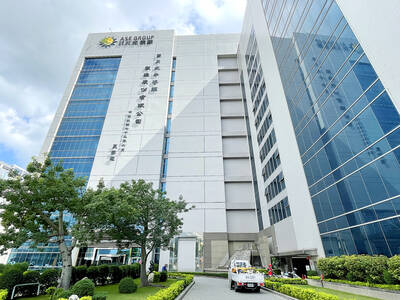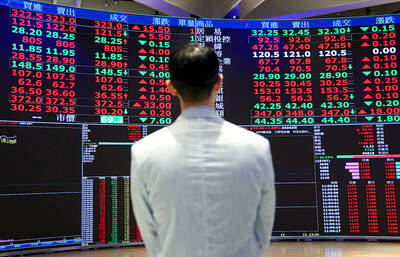The government should continue to provide a favorable business environment for large enterprises because it would increase employment demand and facilitate the nation’s overall economic development, Minister of Finance Lee Sush-der (李述德) said.
Sitting down with staff reporters of the Taipei Times and its Chinese-language sister newspaper the Liberty Times on Feb. 10, the minister talked about the importance of making fiscal policies on a gradual and holistic basis with a focus on economic growth driven by businesses.
“Today, the government is responsible for fostering an economic environment that provides impetus and encouragement for the growth of local businesses. Nurturing big enterprises will help create more job opportunities for middle and low-income households,” Lee said.
The Directorate-General of Budget, Accounting and Statistics released labor market statistics last Monday that showed long-term unemployment reached 115,000 people last month, the highest it’s been since 2004, although the jobless rate fell for the fifth consecutive month to 5.62 percent.
The Ministry of Finance has long been accused of currying favor with big corporations by offering them preferential tax treatment or subsidies, violating the principle of taxation equity and sapping the national treasury, thereby increasing public debt.
Despite worries among experts that preferential tax breaks for big enterprises could result in significant tax revenue losses, the minister said reasonable tax incentives for businesses was a necessity because it would “boost economic growth and industrial development.”
“The government needs to look at the bigger picture and make policies from a holistic perspective, even though we may have to pay a price,” Lee said. “While it is important to achieve fair taxation, we cannot afford to lose out in terms of economic development.”
Lee was referring to a controversial article in a draft bill for promoting innovative industries (產業創新條例) that would give a preferential flat business income tax of 15 percent to the world’s top 500 multinational corporations if they establish corporate headquarters in Taiwan, while local businesses would still be taxed at 20 percent.
The minister said the government would assist local enterprises to help them enter the ranks of the top 500 corporations in the world, adding that other countries are working toward the same goal.
Last Friday, however, Premier Wu Den-yih (吳敦義) said the Cabinet decided to withdraw support for the article amid opposition from business leaders because it was “too controversial.”
In recent years, the government’s tax-cut measures and excessive public borrowing have reportedly worsened the nation’s financial condition. The ministry’s latest tallies show that last year’s tax revenue posted its largest-ever contraction — NT$241.5 billion (US$7.51 billion) — and saw a record shortfall of NT$265.2 billion.
One tax reduction measure that irked the general public was the proposal to reduce the inheritance and gift levy rate from a range of 2 percent to 50 percent to a flat 10 percent, which cleared the legislative floor last January. Many feared that the measure would only favor wealthy people and would fail at inducing capital repatriation.
“The reduced tax rate on the inheritance and gift levy will instead lead to more tax collection because people are more willing to leave their money at home,” Lee said, adding that the measure has even improved the relationship between parents and children.
Insisting that the previous tax-cut policies were effective and necessary, Lee said they included raising the ceiling for income taxes and reducing custom tariffs and commodity taxes, which would benefit not only large corporations but also salary earners.
“But compared with Japan, Singapore and the US, Taiwan’s tax burden and national income are relatively low,” he said. “We are striving to make Taiwan a country with high tax burden, high national income and high public debt.”
Despite the soaring national debt, Lee remained confident regarding the nation’s financial condition.
He said the nation’s fiscal status was still “healthy” based on various indexes such as the government’s cash flow, debt balances and budget allocation, which are all in the reasonable range, as stipulated by law.
The minister said energy taxes would be imposed in two or three years at the earliest, that luxury taxes are still under discussion and that the timing for reinstating securities income taxes is not yet ripe.
“Basically, energy taxes will be imposed based on the principle of equality rather than to increase tax revenue,” he said, adding that the taxes were aimed at changing consumer behavior regarding energy efficiency.
Moreover, the ministry decided last month to increase the property tax on more than 10,000 high-end residences in Taipei City, effective July next year, in an effort to make housing taxation equitable.
Local media reported, however, that the increased amount of taxes would only have a minor effect on wealthy people and would fail to achieve the goal of fair taxation. Instead, those selected buildings will be officially labeled “luxury residences,” further driving up their prices.
“The government’s policies cannot please everyone,” Lee said, adding that old houses and those located in less prosperous locations may be taxed at a lower rate in the future.

EXPANSION: The investment came as ASE in July told investors it would accelerate capacity growth to mitigate supply issues, and would boost spending by 16 percent ASE Technology Holding Co (ASE, 日月光投控), the world’s biggest chip assembly and testing service provider, yesterday said it is investing NT$17.6 billion (US$578.6 million) to build a new advanced chip packaging facility in Kaohsiung to cope with fast-growing demand from artificial intelligence (AI), high-performance-computing (HPC) and automotive applications. The new fab, called K18B, is to commence operation in the first quarter of 2028, offering chip-on-wafer-on-substrate (CoWoS) chip packaging and final testing services, ASE said in a statement. The fab is to create 2,000 new jobs upon its completion, ASE said. A wide spectrum of system-level chip packaging technologies would be available at

Taiwan’s foreign exchange reserves hit a record high at the end of last month, surpassing the US$600 billion mark for the first time, the central bank said yesterday. Last month, the country’s foreign exchange reserves rose US$5.51 billion from a month earlier to reach US$602.94 billion due to an increase in returns from the central bank’s portfolio management, the movement of other foreign currencies in the portfolio against the US dollar and the bank’s efforts to smooth the volatility of the New Taiwan dollar. Department of Foreign Exchange Director-General Eugene Tsai (蔡炯民)said a rate cut cycle launched by the US Federal Reserve

HEAVYWEIGHT: The TAIEX ended up 382.67 points, with about 280 of those points contributed by TSMC shares alone, which rose 2.56 percent to close at NT$1,400 Shares in Taiwan broke records at the end of yesterday’s session after contract chipmaker Taiwan Semiconductor Manufacturing Co (TSMC, 台積電) hit a fresh closing-high amid enthusiasm toward artificial intelligence (AI) development, dealers said. The TAIEX ended up 382.67 points, or 1.45 percent, at the day’s high of 26,761.06. Turnover totaled NT$463.09 billion (US$15.22 billion). “The local main board has repeatedly hit new closing highs in the past few sessions as investors continued to embrace high hopes about AI applications, taking cues from a strong showing in shares of US-based AI chip designer Nvidia Corp,” Hua Nan Securities Co (華南永昌證券) analyst Kevin Su

Nvidia Corp’s major server production partner Hon Hai Precision Industry Co (鴻海精密) reported 10.99 percent year-on-year growth in quarterly sales, signaling healthy demand for artificial intelligence (AI) infrastructure. Revenue totaled NT$2.06 trillion (US$67.72 billion) in the last quarter, in line with analysts’ projections, a company statement said. On a quarterly basis, revenue was up 14.47 percent. Hon Hai’s businesses cover four primary product segments: cloud and networking, smart consumer electronics, computing, and components and other products. Last quarter, “cloud and networking products delivered strong growth, components and other products demonstrated significant growth, while smart consumer electronics and computing products slightly declined,” compared with the